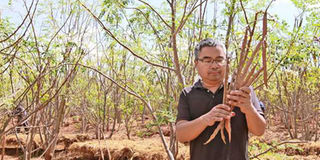Chinese national who is at home growing moringa in dry Makueni

Mr Changhong Li inspects his moringa plants in Katulyani village, Makueni County, on March 4, 2019. PHOTO | PIUS MAUNDU | NATION MEDIA GROUP
What you need to know:
- Mr Changhong Li grows 1,400 bushes on 25 acres between Sultan Hamud and Salama along Mombasa highway
Mr Changhong arrived in Kenya in 2008 following heightened Chinese interest in the country as a trade and investment destination.
He sells his produce to a processor who exports the multiple-use extracts.
At the foot of the enchanting Kiou Hills, situated between Salama and Sultan Hamud townships along the Mombasa-Nairobi highway, sits an expansive moringa farm.
The magnificent farm opposite Kwothithu market teems with 1,400 bushes and belongs to Mr Changhong Li, a Chinese.
The businessman is making locals rethink the value of their land in the semi-arid region as his moringa trees sway with heavy seed pods and white flowers. A team of 32 workers with sacks strapped on their backs is harvesting the seeds and the flowers, which Mr Changhong exports.
INVESTMENT
“Moringa is a special plant whose products are in high demand across the world. It does well in hot and dry conditions like here,” says the 44-year-old.
Mr Changhong arrived in Kenya in 2008 following heightened Chinese interest in the country as a trade and investment destination.
His interests were in aloe vera, castor seeds, macadamia nuts, pyrethrum and sisal fibre, which he often shipped home.
He stands out from most of his countrymen who mainly settle for road works, mineral prospecting, real estate, wildlife trophies, and building of the standard gauge railway line.
“I grew up in the Chinese countryside to farming parents, I loved agriculture early in my life. I actively assisted my parents to grow rice, wheat, maize and pyrethrum throughout my school and college days,” says Mr Changhong, who studied international trade at university. From his 25 acres, the businessman harvests 15 tonnes of moringa, which he sells to Botanical Extracts Ltd based at the Athi River EPZ for processing and export.
He also buys aloe vera, moringa and castor seeds from farmers in the country and across the region to add to what he produces himself, sorts them at a depot in Embakasi, Nairobi, before they are processed at the EPZ firm. “The market for aloe vera, moringa and castor oils in China is huge because of the country’s big population and vibrant economy. Moringa is medicinal,” says Mr Changhon.
1,500 METRES
But how did he choose to farm in Makueni? “One day I was travelling on the Nairobi-Mombasa highway with an application on my iPhone that could help me identify the most suitable place to grow moringa. I stopped at Kiongwani when the app showed that the place was 1,500 metres above sea level and the temperature was 15 degrees Celsius. These were ideal conditions for the tree. I asked a local if I could get some moringa trees and they showed me around,” he recalls.
Later, he met chief Daniel Munyao who told him that castor and moringa trees thrived in the area. Mr Munyao helped him acquire land, says Mr Changhong, a founder member and executive vice-president of the Kenya Chinese Chamber of Commerce (KCCC), an organisation that promotes the welfare of the Chinese business community in the country. There are more than 500 Chinese companies doing business in Kenya, says the farmer.
“They should give back to communities as a way of showing responsibility for the welfare of Kenyans,” says the businessman who recently led a mission to distribute books at Kwale Primary School in Makueni County.
“I like it here. Kenyans are very hard-working and resilient,” says Mr Changhong, who travels home often.
RIGHT TRACK
In China, he says, it is not easy for farmers to get sizeable land to grow crops. Kenya has not scratched the surface of its potential in agriculture and business but it is on the right track, he says.
The father of two plans to set up a factory near his farm to process moringa, a move that has seen him acquire land and recruit neighbours to grow aloe vera, castor and moringa. He has been offering them free seedlings and assuring them of a ready market.
“We have accepted Mr Changhong as one of our own. He is a valuable member of this community because he has created many jobs,” says Mr Munyao, the Kwale area chief.





